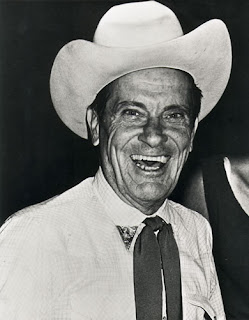This week's post is for any country music fans out there! I've always been a huge fan of the good old country classics, and this week I thought it would be interesting to combine two of my favourite things and discuss how it was affected by wartime. You'll be sure to recognize some names and hopefully even some songs!
First World War
Commercial country music as we know it has its origins in the aftermath of the First World War, during the 1920s. America was determined to return to a peaceful, normal life, and country recordings in the 20s and 30s reflected that sentiment. A noteworthy exception is one side of Jimmie Rodgers's very first recording, "A Soldier's Sweetheart", which recalls "that awful German war". In general, most songs from this period which dealt with war as a theme were about the American Civil War two generations earlier, usually told from the Southern perspective.
 |
| Jimmie Rodgers |
Here is a link to the 1927 recording: https://www.youtube.com/watch?v=s0BSfRSouhs
Second World War
Between 1939 and 1941, America once again saw itself surrounded by a world in conflict, before the Japanese attack on Pearl Harbor in December 1941 caused them to fully enter the war. Denver Darling recounted that fateful day in his song "Cowards Over Pearl Harbor".
 |
| Denver Darling |
The real patriotic hit for 1941 came out of New York through singer Elton Britt. Called "There's a Star-Spangled Banner Waving Somewhere", the song told the unforgettable story of a crippled mountain boy wanting the "help bring the Axis down a peg".
Here's a link to the catchy patriotic tune: https://www.youtube.com/watch?v=lG3y4dyBqTs
Remarkably, country music experienced some major changes as a result of the Second World War. Before 1941, it was a regional product of the American south, but as the war threw Southerners all over the world for service and domestic war industry jobs, they took their music with them. The audience thus exploded and songs became recognized not only nationally but globally.
Eight months into the war, in August 1942, a musicians' union strike resulted in a ban on all new recordings which lasted up to two years. By 1944, of course, the war was still being fought, and country music had not lost any of its previous patriotic enthusiasm. Gene Autry, then a pilot in the Asian theater, released "At Mail Call Today", Eddy Arnold had "Mother's Prayer" and "Did You See My Daddy Over There", And Bob Wills recounted the Pacific war with "White Cross on Okinawa" and "Stars and Stripes on Iwo Jima".
In addition, Ernest Tubb released the song that inspired this week's post: "Soldier's Last Letter". It's a moving and emotional tune written by Redd Stewart during his time as a sergeant in the South Pacific. When Tubb released it in 1944, it became a No. 1 hit on the country charts and stayed there for four weeks. Merle Haggard later had a hit single with the song in 1970.
 |
| The great Ernest Tubb |
Overall, the Second World War saw a major shift in the tradition of country music and wartime, which was born out of the post-WWI period. Some of these songs are tied to the most infamous names in country music, and they're as great to listen to today as they were in the dark days of their release. Country music owes a lot to this time in history, as well as the artists who gave it both a voice and a twang.
Supplementary Information courtesy of "Country Music At War" by Ronnie Pugh for CMT.
Thanks for reading,
Delany



No comments:
Post a Comment